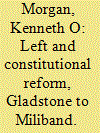|
|
|
Sort Order |
|
|
|
Items / Page
|
|
|
|
|
|
|
| Srl | Item |
| 1 |
ID:
152557


|
|
|
|
|
| Summary/Abstract |
Attempts at a Labour–Liberal Democrat Progressive Alliance came to nothing prior to the 1997 general election. The original idea of progressivism, first mooted in Britain in 1896, was an American one. Suggestions for a progressive alliance in the UK came from Lloyd George in 1914, and then again in 1931, each time with little effect. Nothing emerged after 1945 until the Lib–Lab pact negotiated by Callaghan and Steel in 1977, which led to electoral misfortune for both and the rise and fall of the SDP. In 2010 a coalition between the Lib Dems (under Clegg) and the Conservatives was always much the more likely option. Most Labour people no longer saw the Lib Dems as a party of the left. The Coalition Agreement in 2010 showed the idea of an alliance to be a centrist, elitist one with little grass-roots support. Such an alliance would flourish through abstract pressure groups rather than popular democracy, especially with a Labour party led by Corbyn. In the US and the UK, progressivism went badly wrong in its politics: Theodore Roosevelt's New Nationalist campaign of 1912 divided American reformers fatally, as did Lloyd George's postwar Coalition in Britain after 1918. Now, even after Brexit, a progressive alliance seems further away than ever. The story of the ‘Progressive Dilemma’ remains one of unrealistic projects, invariably disappointed.
|
|
|
|
|
|
|
|
|
|
|
|
|
|
|
|
| 2 |
ID:
122468


|
|
|
|
|
| Publication |
2013.
|
| Summary/Abstract |
Nineteenth-century constitutional reformers focussed on parliament. Their central idea was citizenship, modelled variously on the democracy of ancient Athens, small communities like Switzerland, and especially the United States, a particular inspiration for Gladstone who admired its constitution. The 1911 Parliament Act marked the final triumph of the Victorian Liberals legacy, with a very different impetus coming from Lloyd George during his coalition. Labour focussed on class, not the constitution, though the ILP favoured localism and devolution, before succumbing to a centralising unionism. Tawney championed the idea of social citizenship, emphasising activism and education. After 1945, Labour did not prioritize constitutional reform until the dramatic changes that came after 1997. Gordon Brown then revived the notion of citizenship, and possible codification, in pursuing the values of Britishness. Labour's legacy was a confusing one. But Ed Miliband's policy revision could reclaim the idea of citizenship, an egalitarian concept to counter the inequalities of class.
|
|
|
|
|
|
|
|
|
|
|
|
|
|
|
|
|
|
|
|
|